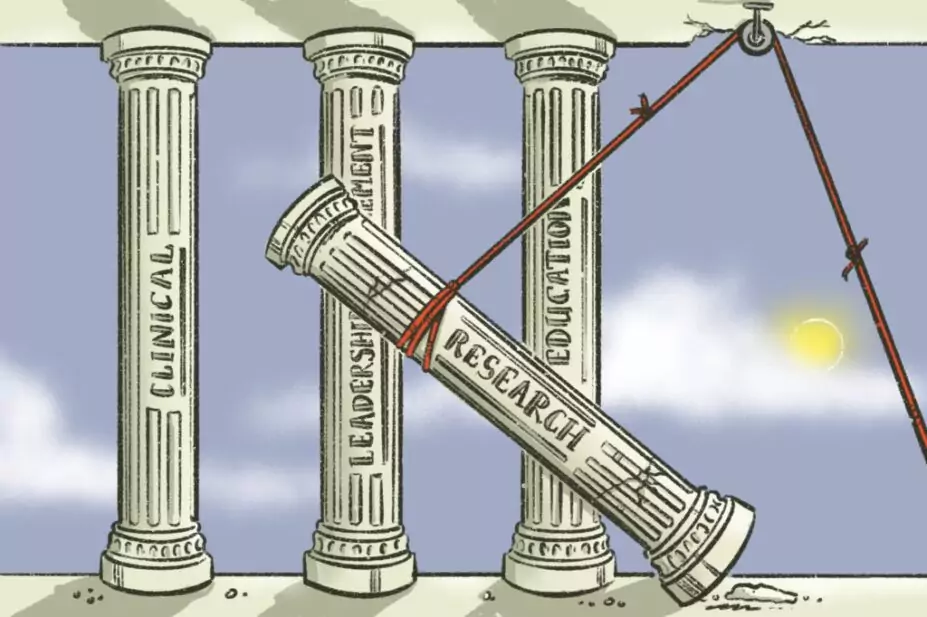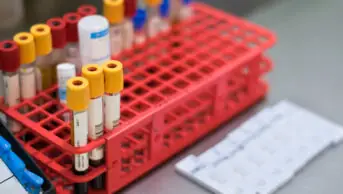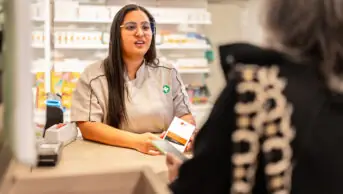
Wes Mountain/The Pharmaceutical Journal
Evidence shows that research-active healthcare settings are associated with better health outcomes for patients, and the ‘NHS long term workforce plan‘ calls for more “clinical academics [who] are crucial to training future generations of healthcare professionals, by leading on research”. The pharmacy profession is only just beginning to introduce research skills training for pharmacists, even though we know from the Department of Health and Social Care’s report ‘Saving and improving lives: the future of UK clinical research delivery’ that “clinical research is the single most important way in which we improve our healthcare”. Why is research yet to be recognised as a core function of all clinical pharmacists’ roles? As one of the four pillars of multi-professional clinical practice, research is considered to have equal status to the clinical, leadership and management, and education pillars by NHS England. But, for pharmacists at least, it sits firmly at the bottom of the pile.
We believe that senior leaders and managers have a responsibility to the workforce to create space for research
In 2026, with the implementation of the Initial education and training of pharmacists reforms, the first cohort of prescribing pharmacists will be released into our hospitals, GP practices and community pharmacies. Undergraduate training is evolving to meet the needs of these future pharmacists, by increasing clinical skills learning and work-based placements. These new pharmacists should, and surely would want to, engage actively in research and service improvement to improve the quality of care for patients. We believe that senior leaders and managers have a responsibility to the workforce to create space for research. Together, we need to do as much as possible to enable a culture of research, so that it becomes the norm rather than the exception.
Acknowledging that barriers to research exist: a lack of time, skills, mentorship and managerial support, workplace culture and competing priorities, the profession has taken steps to help address some of these. For example, flexible research modules, designed specifically for pharmacists, are offered by the Royal Pharmaceutical Society (RPS), in collaboration with the National Institute for Health and Care Research (NIHR). The University of Leicester hosts the NIHR Pharmacy Professionals Incubator, which encourages the development of clinical academic careers. Additionally, the RPS curricula now span the entire career continuum, from foundation to consultant practice, with research a professional expectation at all stages. These curricula can be utilised by healthcare organisations as a structured approach to pharmacists’ job planning linked to appraisal schemes.
The purpose of the NHS England Workforce Education and Training Directorate is to train, retain and reform the healthcare workforce, through commissioning, quality management and workforce planning. Recognising the need to develop pharmacists’ research skills, the North School of Pharmacy and Medicines Optimisation (SoPMO) established a Pharmacy Research Advisory Group in October 2022. Led by the training programme director for advanced practice, its members include consultant pharmacists, academic pharmacists, early-career researchers and primary and secondary care pharmacists from across the region. There is a notable gap in membership in community pharmacy — which is still to be addressed — perhaps highlighting the shortage of research capability and capacity in that sector.
The friendly, informal and judgement-free space that was created contributed to the Fellow’s personal development towards her aim of pursuing a clinical academic career
The group’s initial remit was twofold: to advise SoPMO on research matters and to support a leadership Fellow, tasked with conducting a project to inform the future development of a specific aspect of pharmacy education. The project sought to identify barriers and enablers to research among pharmacists in the north of England. Both SoPMO and the Fellow were motivated to adopt a robust research approach with a view to publication.
The advisory group provided qualitative research advice, signposting to statistical support and guidance on survey design. The fellowship culminated in the production of an internal report for NHS England, an abstract presented at the RPS Annual Conference in November 2023 and a draft journal manuscript. From a cross-sectional survey of 250 pharmacists, Franki Wilson, the research skills development Fellow, found that lack of time within working hours was the most frequently reported barrier to research (68%), followed by prioritisation of clinical duties (51%) and lack of support (38%).
The advisory group shared their wide-ranging experience and expertise to provide guidance that significantly shaped the project. The friendly, informal and judgement-free space that was created contributed to the Fellow’s personal development towards her aim of pursuing a clinical academic career and the group observed growth in her confidence over the 12-month scheme.
Bringing together researchers and research champions, with a shared goal of facilitating pharmacy research, has fostered creativity and enabled the group to gain traction in supporting early-career researchers. The group’s strengths come from its members’ variety of experiences and backgrounds, providing different perspectives and support for one another. Members share and signpost to resources to minimise gaps in knowledge and understanding.
Factors for success are having a specific agreed focus; representation from both academia and practice, to support translational projects; a champion to provide structure and drive; and virtual meetings, allowing cross-regional representation. Discussions about the next focus for the group are underway, with future work likely to be related to consultant pharmacist roles.
The northwest region intends to establish a similar group and we are keen to connect with research-active and research-interested pharmacists across the UK. We are just at the start of this exciting journey, and wish to share our positive experience with pharmacy colleagues and welcome observers at our meetings. For further information, contact Hazel Jamieson at: hazel.jamieson2@nhs.net.


